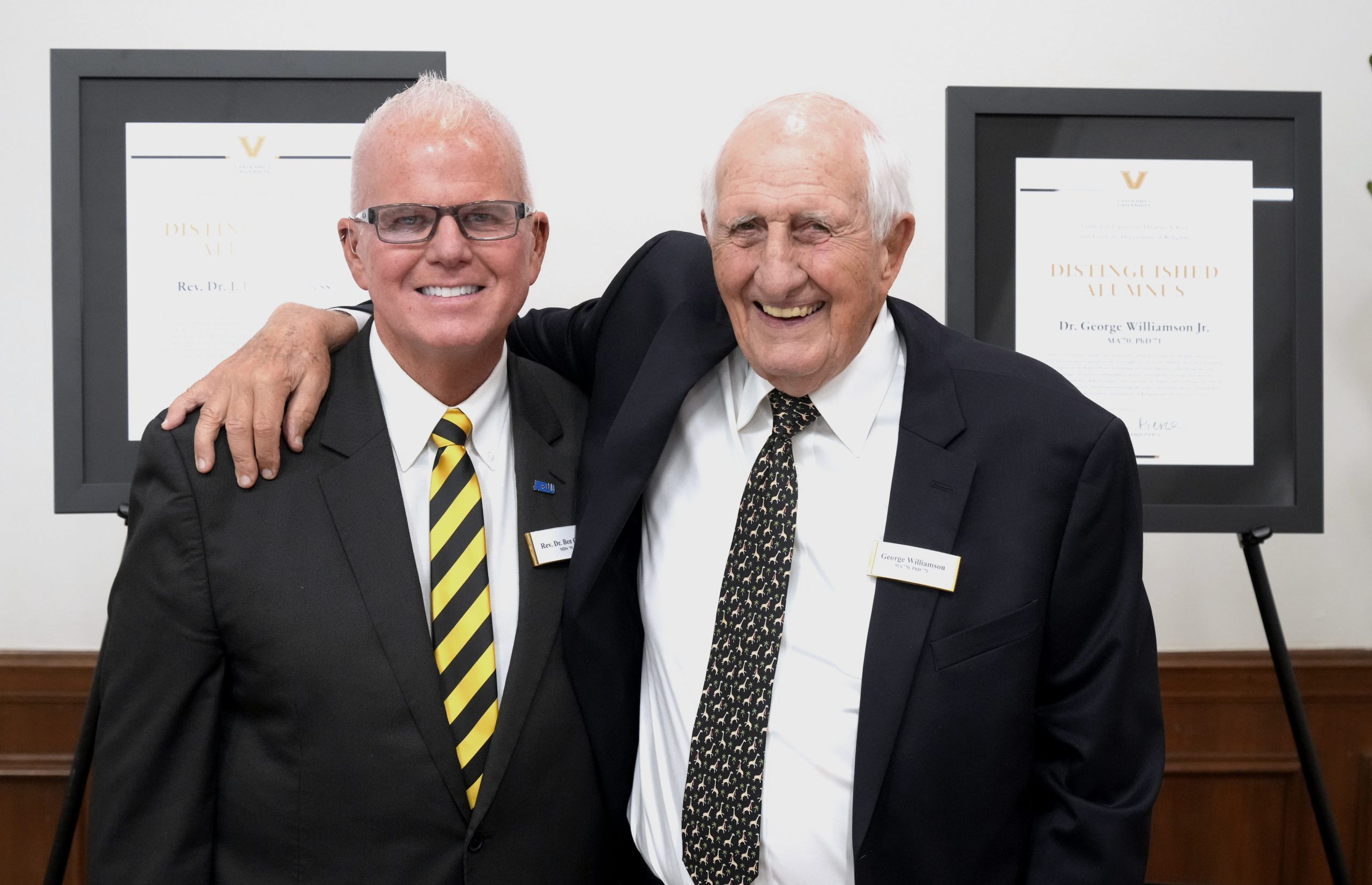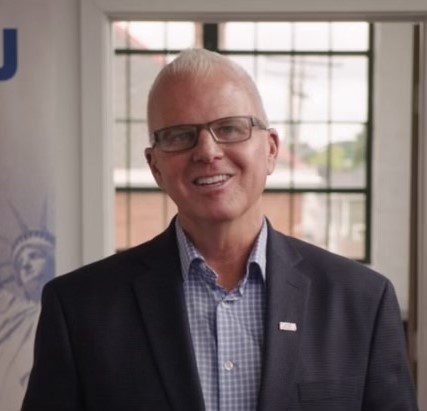
Two Vanderbilt alumni who devoted their lives to ministry, social justice and activism have been recognized as the 2024 Vanderbilt Divinity School and Graduate Department of Religion Distinguished Alumni/ae.
Rev. Dr. J. Bennett Guess, M.Div.’91, is this year’s recipient for Vanderbilt Divinity School. Rev. Dr. George Williamson, Jr., M.A.’70, Ph.D.’71, is the recipient for the Graduate Department of Religion.
“Each year, we proudly honor remarkable alumni—nominated by their peers, mentors and community members—who exemplify our mission of leadership and service. Their commitment to justice and transformative work in churches, communities and beyond has made a profound impact,” said Yolanda Pierce, dean of the Divinity School, Cornelius Vanderbilt Chair and professor of religion and literature. “We are honored to celebrate their achievements as Distinguished Alumni/ae for 2024.”

Guess has exemplified civil liberties, advocacy and transformative leadership throughout his career. A prominent voice for equality and justice, Dr. Guess has played an instrumental role in advancing civil rights initiatives both in Ohio and nationwide.
His dedication to justice began early in his career, when he was licensed to the ministry in 1988 and ordained in 1990, serving local parishes such as Zion United Church of Christ in Henderson, Kentucky, where he transformed a small congregation into a vibrant, multiracial, open and affirming community of over 300 members. From 1992–2000, Dr. Guess was among the earliest openly gay clergy in the UCC’s Indiana-Kentucky Conference. His pastoral work continued in Kentucky in 1994, where he led one of the state’s first openly affirming congregations.
Dr. Guess has also been deeply involved in various justice initiatives, co-founding the Kentucky Fairness Campaign, the state’s leading LGBTQ advocacy organization. He broadened his efforts to health services, leading the initiative to open an on-site Planned Parenthood clinic at his church and co-founded Matthew 25 AIDS Services, one of the largest nonprofit health service providers for individuals with HIV in Kentucky.
Over the past 36 years, Dr. Guess has built an impressive career in ordained ministry and organizational leadership within the UCC and nonprofit sectors. Dr. Guess established monumental precedent as the first openly LGBTQ+ individual elected to serve as a national officer and executive minister of the denomination. He continued making history from 2011–2016 as the first openly LGBTQ+ person elected to its national Collegium of Officers, exemplifying courage and furthering progress within faith-based leadership.
Throughout his career, Dr. Guess has authored numerous articles and op-eds and has been an advocate for racial, social, gender and economic justice. Dr. Guess has also served on numerous boards, including the National LGBTQ Task Force, National Jobs With Justice, the Museum of Contemporary Art Cleveland and many more.
Beyond his ministry work, Dr. Guess has served in multiple capacities as a national director within the UCC, including as director of communications, identity and publications and editor of United Church News, where Dr. Guess advocated and editorialized for the importance of an independent church press, free from editorial oversight of denominational executives. During his tenure, he played an instrumental role in advancing media justice and religious freedom, culminating in his role as lead spokesperson for UCC v. Cooper, the historic case which brought marriage equality to North Carolina in 2014, and eventually the entire U.S. Fourth Circuit.
In June 2017, Dr. Guess became the executive director of the ACLU of Ohio, where he currently leads a team with offices in Columbus, Cleveland and Cincinnati. Under his leadership, the organization advances political participation, voting rights, criminal legal system reform, personal autonomy, dignity and greater inclusion and belonging for all Ohioans. Most recently, he played a leading role in Ohio’s November 2023 ballot campaign, which successfully safeguarded abortion rights and reproductive freedom. Currently, he is integral to Ohio’s campaign to end gerrymandering through the creation of a new citizen-led Independent Redistricting Commission.
Reflecting on his impactful career, Dr. Guess’ academic rigor, theological insight and passion for social justice have profoundly shaped his vocation. His legacy is an ongoing testament to Vanderbilt Divinity School’s mission of fostering transformative leaders who live out their values in service to justice and equity. His work continues to inspire future faith leaders and advocates committed to making lasting change.

Williamson has dedicated his life to justice, ethics and advocacy through ministry and scholarship. Dr. Williamson’s early commitment to social justice can be traced back to his undergraduate years, where he was among the students from Wake Forest and Winston-Salem State University who took part in the historic Greensboro and Winston-Salem lunch counter sit-ins of 1960. These momentous sit-ins launched a critical student leadership movement, with the sit-ins sweeping across the nation as students protested segregated lunch counters and other public spaces, with many white students joining the effort. The sit-ins Dr. Williamson took part in also included several arrests, and attracted widespread media attention to the issue of segregation.
On February 23, 1960, a Winston-Salem sit-in marked a milestone as the first to include white participants—among them, ten students from Wake Forest, including Dr. Williamson. With twenty individuals, both black and white, standing together, this gathering became the first sit-in to result in arrests, including Dr. Williamson, establishing a powerful precedent just days before the Nashville sit-ins led by Rev. James Lawson. The sit-in ultimately led to the desegregation of the city’s restaurants and lunch counters just three months later, making it the first successful sit-in protest in North Carolina.
As a doctoral candidate, Dr. Williamson was appointed chaplain and associate professor of religion at Vassar College, where he served and taught for over a decade, instilling in students a commitment to social justice and ethical leadership until 1981. He was also a member of the Science, Technology and Society Program and the American Culture multi-disciplinary programs at Vassar, where his leadership ultimately led them to divest from South Africa.
Dr. Williamson then returned to pastoral work, where he was called to serve as pastor of First Baptist Church of Granville, Ohio, now known as The United Church of Granville. During his tenure, he led FBC Granville to be Welcoming and Affirming and presented and advocated for LGBTQ issues before the denomination. At the time, FBC Granville was the only place for gay weddings and ordinations in the area. Under Dr. Williamson’s leadership, the church also became headquarters for Habitat for Humanity and an AIDS Task Force. Additionally, FBC Granville was part of the Sanctuary Movement, a political and religious campaign that emerged in the early 1980s, dedicated to offering safe haven for Central American refugees. These efforts were not without challenge, as they faced fierce opposition from those opposed to LGBTQ rights and sanctuary practices. The church’s Feminist Sunday School class played a pivotal role in the organization Women Have Options, providing essential support to women who faced barriers to accessing abortion services. In the mid-1980s, the church also contributed to the historic Gang Summit, a groundbreaking peace gathering in St. Louis that brought together gang leaders from across the country in the pursuit of nonviolent solutions. Additionally, the congregation supported the Progressive Prisoners Movement, founded by a former inmate in the congregation, which worked to offer resources and solidarity to incarcerated individuals nationwide.
In 1984, Dr. Williamson, with other peacemakers, founded the Baptist Peace Fellowship of North America, an organization devoted to peace and reconciliation, where he served as the founding president. Dr. Williamson played a key role in organizing and leading the founding meeting of the BPFNA. Notably, Dr. Williamson represented BPFNA, now known as BPFNA ~ Bautistas por la Paz, on a peace mission to Iraq one month before the first Iraq War. During the Contra War, FBC Granville, in collaboration with the BPFNA, purchased a school bus, stocked it with essential food and medicine, and sent it to Nicaragua. Two families from the congregation undertook the journey, delivering aid to support the work of Gustavo Parajon, a former student pastor who was engaged in critical medical and agricultural work in the Nicaraguan jungles. BPFNA continues to thrive, with Dr. Williamson’s legacy deeply embedded in its peacemaking mission.
A trailblazer in promoting inclusivity, Dr. Williamson was instrumental in guiding BPFNA to affirm the LGBTQ+ community, an effort that has had a lasting impact on the organization and its members. Dr. Williamson inspired countless others to feel welcome and affirmed in their identities. In addition to his advocacy work, Dr. Williamson served on the Wake Forest University School of Divinity Board of Visitors and the Vanderbilt Divinity School Board of Visitors, further demonstrating his commitment to nurturing future leaders in ministry and social justice.
Dr. Williamson’s memoir, Born in Sin, Upended in Grace, recounts the pivotal lunch counter sit-ins of 1960s as the first of many transformative experiences in his evolving commitment to justice and peace. An influential voice for harmony, Dr. Williamson continued his work as a writer, publishing Radicals! Anabaptists and the Current World Crisis: A Manifesto, where he issued a call to reject religious authoritarianism and violence. His words continue to serve as a moral compass, inspiring readers to live with courage and integrity in the face of injustice.
Today, Dr. Williamson is retired but remains active as a guest preacher and mentor, influencing new generations to carry forward the principles of peace, justice and inclusion. He has also been particularly involved in refugee resettlement, dedicating his time and expertise to help integrate displaced individuals and families into new communities. His service to the Vanderbilt community, the Baptist Peace Fellowship and the larger ecumenical world exemplifies a life lived in alignment with the highest ethical ideals.
Through their empowering journeys, Dr. Guess and Dr. Williamson exemplify the values of Vanderbilt Divinity School and the Graduate Department of Religion, illustrating the profound power of faith, justice and compassionate leadership. Their enduring legacies continue to inspire our community and remind us of the impact that commitment and courage can have on society and future generations.